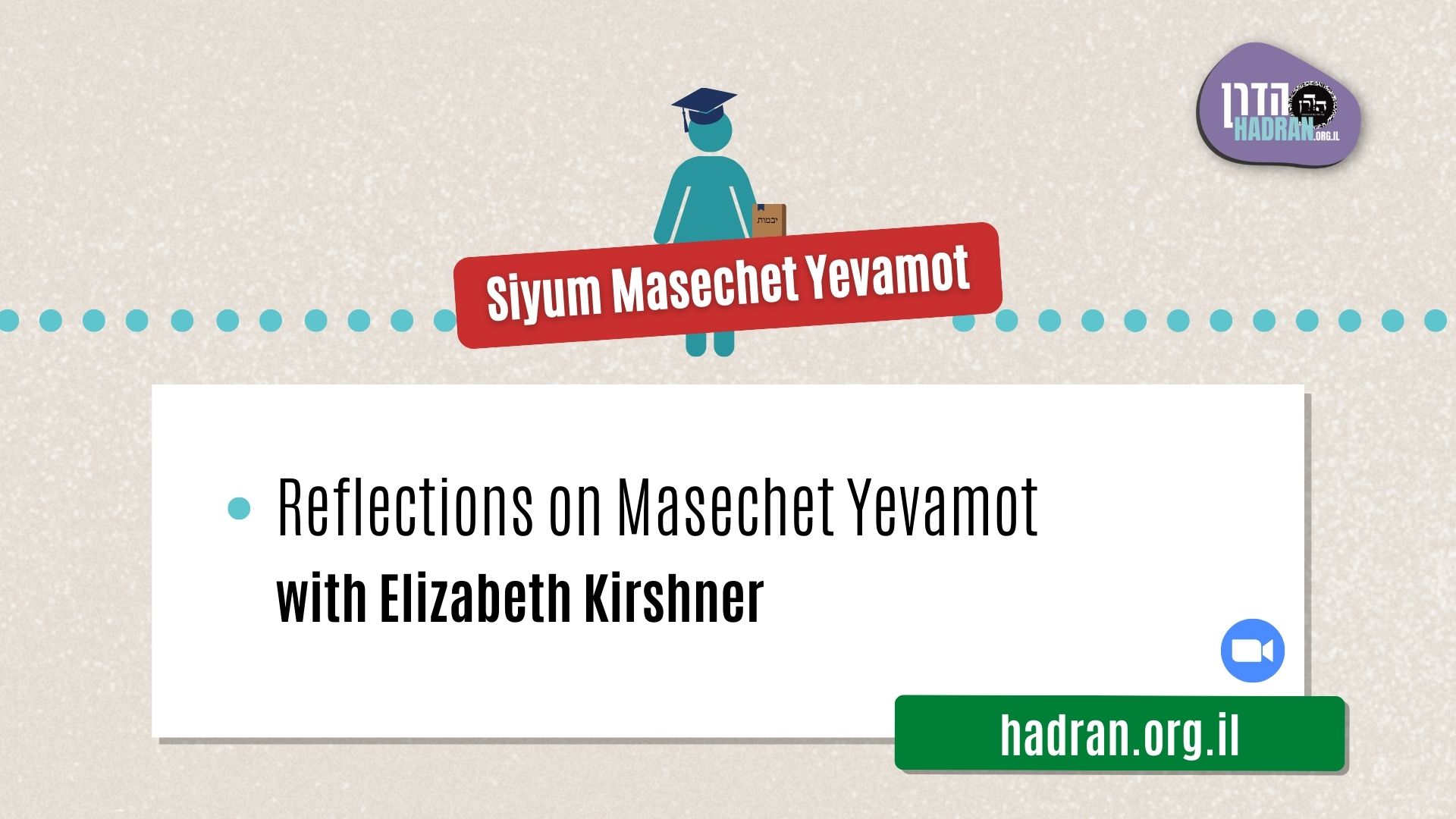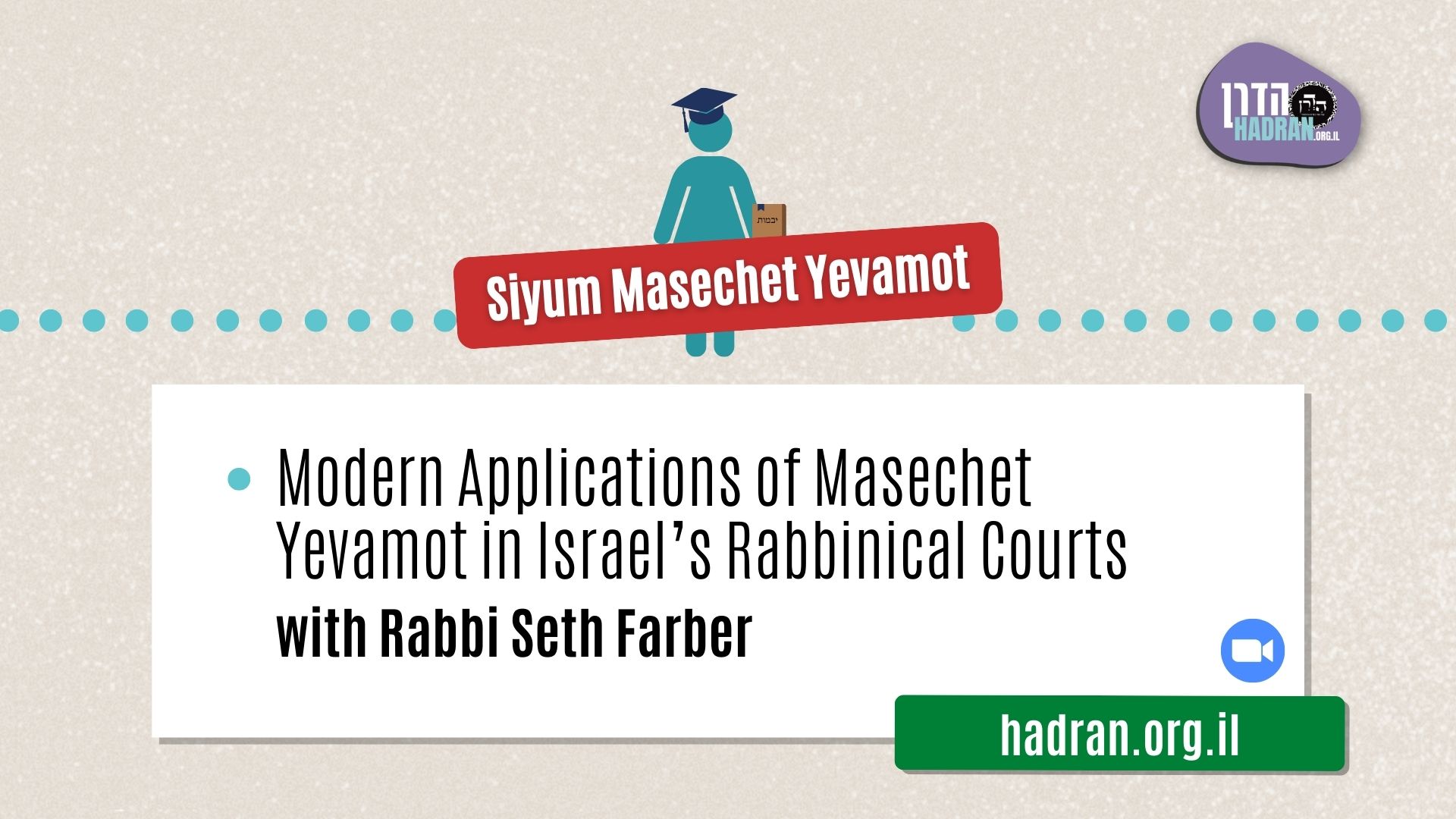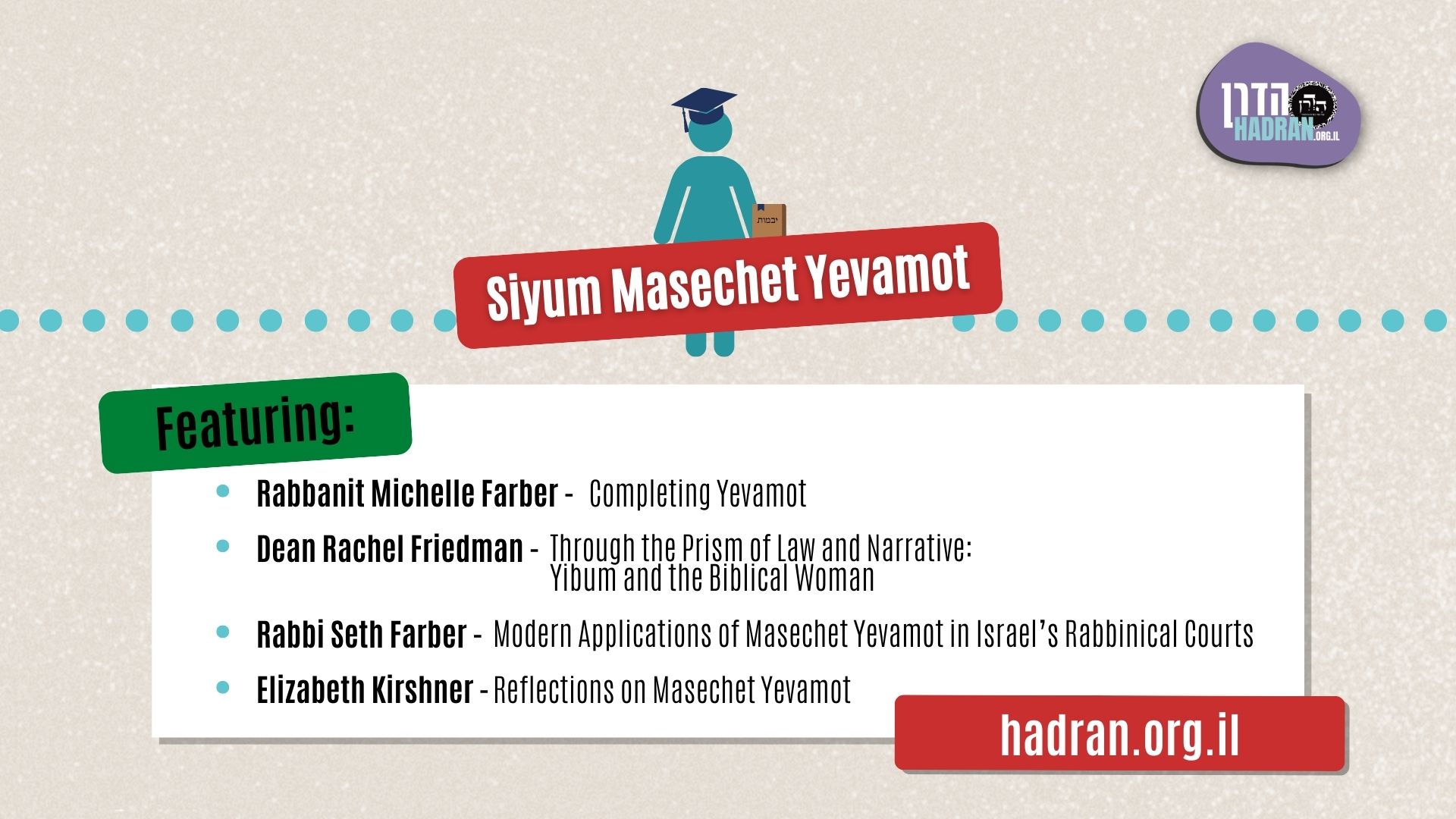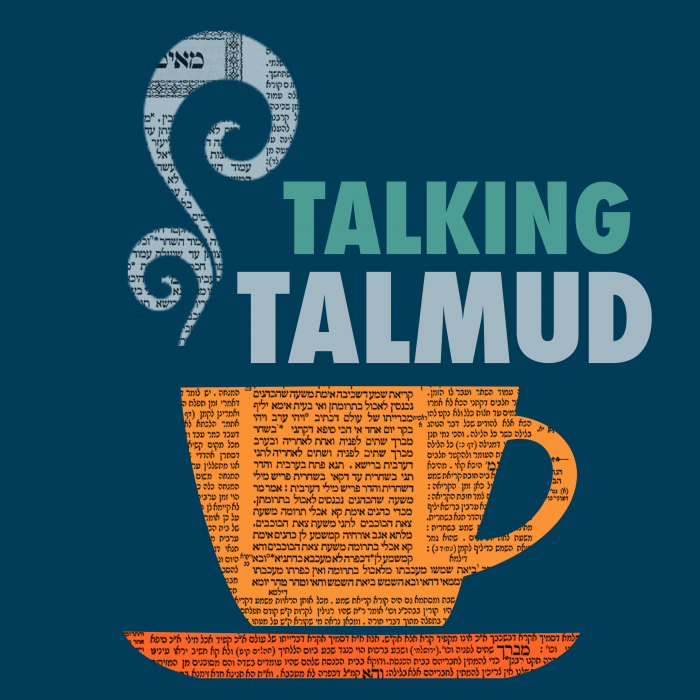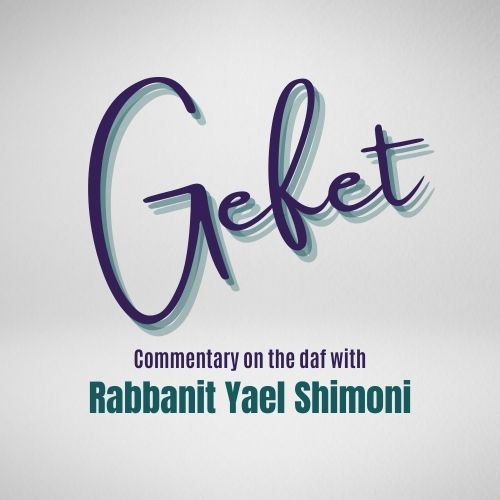Yevamot 122
תְּלָתָא רִיגְלֵי. אֲמַר לַהּ רַב אַדָּא בַּר אַהֲבָה: זִיל לְקַמֵּיהּ דְּרַב יוֹסֵף, דְּחָרִיף סַכִּינֵאּ.
for three pilgrim Festivals, on which the Sages gather together to study, but he could not resolve this uncertainty on any of those occasions. Rav Adda bar Ahava said to her: Go before Rav Yosef, whose knife is sharp, i.e., he has keen insight into halakhic matters, and ask him to decide your case.
אֲזַלָה קַמֵּיהּ. פְּשַׁט מֵהָא מַתְנִיתִין: גּוֹי שֶׁהָיָה מוֹכֵר פֵּירוֹת בַּשּׁוּק, וְאָמַר: ״פֵּירוֹת הַלָּלוּ שֶׁל עׇרְלָה הֵן״ ״שֶׁל עֲזֵיקָה הֵן״, ״שֶׁל נֶטַע רְבָעִי הֵן״ — לֹא אָמַר כְּלוּם, לֹא נִתְכַּוֵּון אֶלָּא לְהַשְׁבִּיחַ מִקָּחוֹ.
She went before him and he resolved the case based on this baraita: With regard to a gentile who was selling fruit at the market and said: These fruits are from the first three years of the tree’s growth [orla]; or they are from Azeka, i.e., land tilled on the Sabbatical Year, the produce of which it is prohibited to eat; or they are fourth-year produce, which it is prohibited to eat outside of Jerusalem, he has said nothing of consequence. His statement is not deemed credible, since it is possible that he intended only to enhance the reputation of his goods, as he thought that his produce would fetch a higher price if he described it in that fashion. Rav Yosef derived from this baraita that in the case of the missing Jew, the gentile’s statement could not be relied upon, as he may have stated it only to promote his own agenda.
אַבָּא יוּדָן אִישׁ צַיְידָן אָמַר: מַעֲשֶׂה בְּיִשְׂרָאֵל וְגוֹי שֶׁהָלְכוּ בַּדֶּרֶךְ, וּבָא גּוֹי וְאָמַר: ״חֲבָל עַל יְהוּדִי שֶׁהָיָה עִמִּי בַּדֶּרֶךְ שֶׁמֵּת בַּדֶּרֶךְ, וּקְבַרְתִּיו״, וְהִשִּׂיאוּ אִשְׁתּוֹ.
Abba Yudan of Sidon said: An incident occurred involving a Jew and a gentile who traveled on the road, and later the gentile came and said: Alas for the Jew who was with me on the road, for he died, and I buried him. And the Sages relied upon this statement and allowed his wife to marry.
וְשׁוּב מַעֲשֶׂה בְּקוֹלָר שֶׁל בְּנֵי אָדָם, שֶׁהָיוּ מְהַלְּכִין לְאַנְטוֹכְיָא, וּבָא גּוֹי אֶחָד וְאָמַר: ״חֲבָל עַל קוֹלָר שֶׁל בְּנֵי אָדָם שֶׁמֵּתוּ, וּקְבַרְתִּים״, וְהִשִּׂיאוּ אֶת נְשׁוֹתֵיהֶם. וְשׁוּב מַעֲשֶׂה בְּשִׁשִּׁים בְּנֵי אָדָם שֶׁהָיוּ מְהַלְּכִין לְכַרְכּוֹם בֵּיתֵּר, וּבָא גּוֹי וְאָמַר: ״חֲבָל עַל שִׁשִּׁים בְּנֵי אָדָם שֶׁהָיוּ מְהַלְּכִין בְּדֶרֶךְ בֵּיתֵּר שֶׁמֵּתוּ, וּקְבַרְתִּים״ וְהִשִּׂיאוּ אֶת נְשׁוֹתֵיהֶם.
And there was another incident involving a group of people who had been taken prisoner, each of whom was shackled with a collar [kolar] around his neck, and they were walking to Antokhya. And some time later a certain gentile came and said: Alas for the group of collared people, for they died, and I buried them. And the Sages allowed their wives to marry. And there was yet another incident involving sixty people who were walking to the siege [karkom] of Beitar, and later a gentile came and said: Alas for those sixty people who were walking on the road to Beitar, for they died, and I buried them. And the Sages allowed their wives to marry.
מַתְנִי׳ מְעִידִין לְאוֹר הַנֵּר וּלְאוֹר הַלְּבָנָה, וּמַשִּׂיאִין עַל פִּי בַּת קוֹל. מַעֲשֶׂה בְּאֶחָד שֶׁעָמַד עַל רֹאשׁ הָהָר וְאָמַר: ״אִישׁ פְּלוֹנִי בֶּן פְּלוֹנִי מִמָּקוֹם פְּלוֹנִי מֵת״. הָלְכוּ וְלֹא מָצְאוּ שָׁם אָדָם, וְהִשִּׂיאוּ אֶת אִשְׁתּוֹ.
MISHNA: Witnesses may testify that an individual died even if they saw his corpse only by candlelight or by moonlight. And the court may allow a woman to marry based on the statement of a disembodied voice proclaiming that her husband died. There was an incident with regard to a certain individual who stood at the top of a mountain and said: So-and-so, son of so-and-so, from such and such a place died. They went and found no person there, but even so they relied upon the statement and allowed the wife of the individual declared dead to marry.
וְשׁוּב מַעֲשֶׂה בְּצַלְמוֹן, בְּאֶחָד שֶׁאָמַר: ״אֲנִי אִישׁ פְּלוֹנִי בֶּן אִישׁ פְּלוֹנִי, נְשָׁכַנִי נָחָשׁ וַהֲרֵי אֲנִי מֵת״. וְהָלְכוּ וְלֹא הִכִּירוּהוּ, וְהָלְכוּ וְהִשִּׂיאוּ אֶת אִשְׁתּוֹ.
And there was another incident in Tzalmon, a city in the Galilee, where a particular man said: I am so-and-so, son of so-and-so. A snake bit me and I am dying. And they went and found his corpse but could not recognize him, yet they went ahead and allowed his wife to marry based on what he said in his dying moments.
גְּמָ׳ אָמַר רַבָּה בַּר שְׁמוּאֵל: תָּנָא, בֵּית שַׁמַּאי אוֹמְרִים: אֵין מַשִּׂיאִין עַל פִּי בַּת קוֹל. וּבֵית הִלֵּל אוֹמְרִים: מַשִּׂיאִין עַל פִּי בַּת קוֹל. מַאי קָא מַשְׁמַע לַן, מַתְנִיתִין הִיא! הָא קָא מַשְׁמַע לַן דְּאִי מַשְׁכַּחַתְּ סְתָמָא דְּאֵין מַשִּׂיאִין — בֵּית שַׁמַּאי הִיא.
GEMARA: Rabba bar Shmuel said: It was taught in a baraita that Beit Shammai say: The judges of a court may not allow a woman to marry based on the statement of a disembodied voice; they require actual testimony. And Beit Hillel say: The judges may allow a woman to marry based on the statement of a disembodied voice. The Gemara asks: What is Rabba bar Shmuel teaching us here? This is simply our mishna, since the decisive ruling follows Beit Hillel’s opinion. The Gemara answers that he teaches us this: That if an anonymous mishna or baraita is found that states that the judges may not allow a woman to marry under such circumstances, it is simply the opinion of Beit Shammai, and is not the accepted ruling.
וְהָלְכוּ וְלֹא מָצְאוּ. וְדִלְמָא שֵׁד הֲוָה? אָמַר רַב יְהוּדָה אָמַר רַב: שֶׁרָאוּ לוֹ דְּמוּת אָדָם. אִינְהוּ נָמֵי דָּמוּ! דַּחֲזוֹ לֵיהּ בָּבוּאָה.
With regard to the incident where they heard a disembodied voice but went and found no person there, which is mentioned in the mishna, the Gemara asks: Perhaps it was a demon. Rav Yehuda said that Rav said: They saw that he had the form of a person, so they knew it was not a demon. The Gemara asks: They, i.e., demons, also appear similar to people. The Gemara answers: They saw that he had a shadow.
וְאִינְהוּ נָמֵי אִית לְהוּ בָּבוּאָה! דַּחֲזוֹ לֵיהּ בָּבוּאָה דְבָבוּאָה. וְדִלְמָא לְדִידְהוּ אִית לְהוּ בָּבוּאָה דְבָבוּאָה. אָמַר רַבִּי חֲנִינָא, אָמַר לִי יוֹנָתָן שֵׁידָא: בָּבוּאָה — אִית לְהוּ, בָּבוּאָה דְבָבוּאָה — לֵית לְהוּ.
The Gemara asks: But they also have a shadow. The Gemara answers: It was a case where they saw that he had a shadow of a shadow. The Gemara asks: But perhaps they also have a shadow of a shadow? Rabbi Ḥanina said: Yonatan the demon expert said to me: They have a shadow, but they do not have a shadow of a shadow.
וְדִלְמָא צָרָה הֲוַאי? תָּנָא דְּבֵי רַבִּי יִשְׁמָעֵאל: בִּשְׁעַת הַסַּכָּנָה כּוֹתְבִין וְנוֹתְנִין, אַף עַל פִּי שֶׁאֵין מַכִּירִין.
The Gemara asks: And perhaps it was a rival wife, or some other enemy of that man’s wife, who cried out that her husband was dead and then fled, in order to trick her into disgracing herself by remarrying while her husband was still alive? The Gemara answers: The school of Rabbi Yishmael taught: During a period of danger, one may write and give a bill of divorce to a woman, although the witnesses do not know the husband, because we do not raise many suspicions at such a time. This case was similar to a period of danger in that they did not find witnesses that her husband died, and therefore the court did not require further clarification.
מַתְנִי׳ אָמַר רַבִּי עֲקִיבָא: כְּשֶׁיָּרַדְתִּי לִנְהַרְדְּעָא לְעַבֵּר הַשָּׁנָה, מְצָאַנִי נְחֶמְיָה אִישׁ בֵּית דְּלִי, אָמַר לִי: שָׁמַעְתִּי שֶׁאֵין מַשִּׂיאִין אֶת הָאִשָּׁה בְּאֶרֶץ יִשְׂרָאֵל עַל פִּי עֵד אֶחָד אֶלָּא יְהוּדָה בֶּן בָּבָא. וְנוּמֵּיתִי לוֹ: כֵּן הַדְּבָרִים. אָמַר לִי, אֱמוֹר לָהֶם מִשְּׁמִי: אַתֶּם יוֹדְעִים שֶׁהַמְּדִינָה מְשׁוּבֶּשֶׁת בִּגְיָיסוֹת, מְקוּבְּלַנִי מֵרַבָּן גַּמְלִיאֵל הַזָּקֵן שֶׁמַּשִּׂיאִין אֶת הָאִשָּׁה עַל פִּי עֵד אֶחָד.
MISHNA: Rabbi Akiva said: When I descended to Neharde’a, in Babylonia, to intercalate the year, I found the Sage Neḥemya of Beit D’li. He said to me: I heard that the Sages in Eretz Yisrael do not allow a woman to remarry based on the testimony of a single witness, except for Yehuda ben Bava. And I told him: That is so. He said to me: Tell the Sages in my name: You know that the country is confounded by army troops, and I cannot come myself. I declare that I received this tradition from Rabban Gamliel the Elder, that the court may allow a woman to remarry based on the testimony of a single witness.
וּכְשֶׁבָּאתִי וְהִרְצֵיתִי הַדְּבָרִים לִפְנֵי רַבָּן גַּמְלִיאֵל, שָׂמַח לִדְבָרַי, וְאָמַר: מָצָאנוּ חָבֵר לְרַבִּי יְהוּדָה בֶּן בָּבָא.
Rabbi Akiva continues: And when I came and presented the matter before Rabban Gamliel of Yavne, the grandson of Rabban Gamliel the Elder, he rejoiced at my words and said: We have found a companion who agrees with Rabbi Yehuda ben Bava, and since his lenient opinion is no longer the opinion of a lone Sage, it may now be relied upon.
מִתּוֹךְ הַדָּבָר, נִזְכַּר רַבָּן גַּמְלִיאֵל שֶׁנֶּהֶרְגוּ הֲרוּגִים בְּתֵל אַרְזָא, וְהִשִּׂיא רַבָּן גַּמְלִיאֵל נְשׁוֹתֵיהֶן עַל פִּי עֵד אֶחָד. וְהוּחְזְקוּ לִהְיוֹת מַשִּׂיאִין עֵד מִפִּי עֵד, מִפִּי עֶבֶד, מִפִּי אִשָּׁה, מִפִּי שִׁפְחָה. רַבִּי אֱלִיעֶזֶר וְרַבִּי יְהוֹשֻׁעַ אוֹמְרִים: אֵין מַשִּׂיאִין אֶת הָאִשָּׁה עַל פִּי עֵד אֶחָד. רַבִּי עֲקִיבָא אוֹמֵר: לֹא עַל פִּי אִשָּׁה, וְלֹא עַל פִּי עֶבֶד, וְלֹא עַל פִּי שִׁפְחָה, וְלֹא עַל פִּי קְרוֹבִים.
As a result of this event, Rabban Gamliel remembered that people were murdered in Tel Arza, and Rabban Gamliel then allowed their wives to remarry based on only one witness. And from then onward they established as protocol to allow a woman to remarry based on hearsay testimony, a slave’s testimony, a woman’s testimony, or a maidservant’s testimony. Rabbi Eliezer and Rabbi Yehoshua say: The court may not allow a woman to remarry based on only one witness. Rabbi Akiva says: The court may not allow a woman to marry based on the testimony of a woman, nor based on the testimony of a slave, nor based on the testimony of a maidservant, nor based on the testimony of close relatives.
גְּמָ׳ וְסָבַר רַבִּי עֲקִיבָא עַל פִּי אִשָּׁה לָא? וְהָתַנְיָא, רַבִּי שִׁמְעוֹן בֶּן אֶלְעָזָר אוֹמֵר מִשּׁוּם רַבִּי עֲקִיבָא: אִשָּׁה נֶאֱמֶנֶת לְהָבִיא גִּיטָּהּ מִקַּל וָחוֹמֶר; וּמָה נָשִׁים שֶׁאָמְרוּ חֲכָמִים אֵין נֶאֱמָנוֹת לוֹמַר ״מֵת בַּעְלָהּ״ — נֶאֱמָנוֹת לְהָבִיא גִּיטֵּיהֶן, זוֹ שֶׁנֶּאֱמֶנֶת לוֹמַר ״מֵת בַּעְלָהּ״ — אֵינוֹ דִּין שֶׁנֶּאֱמֶנֶת לְהָבִיא גִּיטָּהּ.
GEMARA: The Gemara asks: Does Rabbi Akiva hold that the court may not allow a woman to remarry based on another woman’s testimony? But isn’t it taught in a baraita: Rabbi Shimon ben Elazar says in the name of Rabbi Akiva: A woman is trusted to bring her own bill of divorce and affirm in court that it was written and signed properly, and that trust is based on the following a fortiori inference: If women, e.g., a rival wife, whom the Sages said are not deemed credible to say that another woman’s husband died, are nevertheless trusted to bring their bills of divorce, then is it not logical that this woman herself, who is deemed credible to say that her husband died, should be trusted to bring her own bill of divorce?
נָשִׁים שֶׁאָמְרוּ חֲכָמִים הוּא דְּלָא מְהֵימְנִי, אִשָּׁה בְּעָלְמָא — מְהֵימְנָא. לָא קַשְׁיָא: כָּאן קוֹדֶם שֶׁהֶחֱזִיקוּ, כָּאן לְאַחַר שֶׁהֶחֱזִיקוּ.
This statement indicates that according to Rabbi Akiva, it is specifically the women who the Sages mentioned who are not deemed credible. In general, a woman is deemed credible, and another woman is permitted to remarry on the basis of her testimony. The Gemara answers: This is not difficult. Here, where Rabbi Akiva disqualified the testimony of a woman, it was before they established the protocol that a woman may be permitted to remarry on the basis of another woman’s testimony. There, where he allowed it, it was after they established that protocol.
מַתְנִי׳ אָמְרוּ לוֹ: מַעֲשֶׂה בִּבְנֵי לֵוִי שֶׁהָלְכוּ לְצוֹעַר עִיר הַתְּמָרִים, וְחָלָה אֶחָד מֵהֶם, וֶהֱבִיאוּהוּ בְּפוּנְדָּק. וּבַחֲזָרָתָם אָמְרוּ לַפּוּנְדָּקִית: ״אַיֵּה חֲבֵרֵנוּ?״ נוּמֵּית לָהֶם: ״מֵת, וּקְבַרְתִּיו״, וְהִשִּׂיאוּ אֶת אִשְׁתּוֹ. וְלֹא תְּהֵא כֹּהֶנֶת כְּפוּנְדָּקִית?
MISHNA: They said to Rabbi Akiva: Do we not rely upon a woman’s testimony? After all, an incident occurred involving Levites who traveled to Tzoar, the city of date palms. And one of them became ill, and they brought him to an inn [pundak] to rest, while they continued on their travels. Upon their return to the inn they said to the innkeeper, who was a woman: Where is our friend? She told them: He died, and I buried him. And based on her testimony they allowed his wife to remarry. And shouldn’t a priestess, or any Jewish woman who testifies that a man died, be deemed as credible as an innkeeper?
אֲמַר לְהוּ: לִכְשֶׁתְּהֵא כְּפוּנְדָּקִית — נֶאֱמֶנֶת. הַפּוּנְדָּקִית הוֹצִיאָה לָהֶם מַקְלוֹ וְתַרְמִילוֹ וְסֵפֶר תּוֹרָה שֶׁהָיָה בְּיָדוֹ.
Rabbi Akiva said to them: When a woman will be as convincing as the innkeeper, then she shall also be deemed credible. The innkeeper brought them his staff, and his bag, and the Torah scroll that was in his possession, thereby providing supporting evidence to reinforce her claim.
גְּמָ׳ מַאי גְּרִיעוּתָא דְּפוּנְדָּקִית? אָמַר רַב כָּהֲנָא: פּוּנְדָּקִית — גּוֹיָה הָיְתָה, וּמְסִיחָה לְפִי תּוּמָּה הָיְתָה: ״זֶה מַקְלוֹ, וְזֶה תַּרְמִילוֹ, וְזֶה קֶבֶר שֶׁקְּבַרְתִּיו בּוֹ״. וְכֵן תָּנֵי אַבָּא בְּרֵיהּ דְּרַב מִנְיוֹמֵי בַּר חִיָּיא: פּוּנְדָּקִית גּוֹיָה הָיְתָה, וּמְסִיחָה לְפִי תּוּמָּה הָיְתָה: ״זֶה מַקְלוֹ, וְזֶה תַּרְמִילוֹ, וְזֶה קֶבֶר שֶׁקְּבַרְתִּיו בּוֹ״.
GEMARA: The mishna assumed that an innkeeper is less trustworthy than an ordinary woman, such that the Rabbis argued that if the innkeeper was deemed credible, it should be obvious that an ordinary woman should be deemed credible. The Gemara asks: What was unfavorable about the innkeeper that made her less trustworthy than an ordinary woman? Rav Kahana said: She was a gentile innkeeper, and she was therefore deemed credible only because she was speaking offhandedly when she said that the man died and this is his staff, and this is his bag, and this is the grave in which I buried him. And similarly, Abba, son of Rav Minyumi, son of Ḥiyya, taught: She was a gentile innkeeper, and she was speaking offhandedly, saying that this is his staff, and this is his bag, and this is the grave in which I buried him.
וְהָא ״אַיֵּה חֲבֵרֵנוּ״ קָאָמְרִי לָהּ? כֵּיוָן דַּחֲזֵיתִינְהוּ, בָּכְיָא. אָמְרוּ לָהּ: ״אַיֵּה חֲבֵרֵנוּ?״ אָמְרָה לָהֶם: ״מֵת וּקְבַרְתִּיו״.
But didn’t they say to her: Where is our friend? This indicates that she was answering their question rather than speaking offhandedly. The Gemara explains: Once she saw them, she cried. They said to her: Where is our friend? Then she said to them: He died, and I buried him. Since she cried before being questioned, the crying was considered the beginning of her account, and she is considered to have been speaking offhandedly.
תָּנוּ רַבָּנַן: מַעֲשֶׂה בְּאָדָם אֶחָד שֶׁבָּא לְהָעִיד עַל הָאִשָּׁה לִפְנֵי רַבִּי טַרְפוֹן. אָמַר לוֹ: ״בְּנִי, הֵיאַךְ אַתָּה יוֹדֵעַ בְּעֵדוּת אִשָּׁה זוֹ?״ אָמַר: ״אֲנִי וָהוּא הָיִינוּ הוֹלְכִים בַּדֶּרֶךְ, וְרָדַף אַחֲרֵינוּ גַּיִיס, וְנִתְלָה בְּיִיחוּר שֶׁל זַיִת וּפְשָׁחוֹ, וְהֶחְזִיר אֶת הַגַּיִיס לַאֲחוֹרָיו״.
§ The Sages taught: An incident occurred involving a certain individual who came to testify before Rabbi Tarfon with regard to a woman whose husband had died. He said to him: My son, how do you come to know testimony that the husband of this woman died? He said: He and I were traveling on the road together, and a troop of soldiers chased after us. He hung onto an olive branch, and tore it off to use as a heavy staff to intimidate the soldiers, and forced the troop to withdraw.
״אָמַרְתִּי לוֹ: ׳אַרְיֵה! יִישַׁר כֹּחֲךָ׳. אָמַר לִי: ׳מִנַּיִן אַתָּה יוֹדֵעַ שֶׁאַרְיֵה שְׁמִי? כָּךְ קוֹרִין אוֹתִי בְּעִירִי: יוֹחָנָן בְּרַבִּי יְהוֹנָתָן, אַרְיֵה דְּמִכְּפַר שִׁיחְיָא׳. לְיָמִים חָלָה וּמֵת.״ וְהִשִּׂיא רַבִּי טַרְפוֹן אֶת אִשְׁתּוֹ.
After this heroic act I said to him, admiring his bravery: Lion [arye], may your strength continue to be firm. He said to me: From where do you know that my name is Arye? That is what they call me in my city: Yoḥanan, son of Rabbi Yehonatan, the lion from the village Shiḥayya. After a while, he fell sick and died, and consequently the fellow traveler knew his name and could testify about him. And Rabbi Tarfon allowed his wife to marry based on this testimony.
וְרַבִּי טַרְפוֹן לָא בָּעֵי דְּרִישָׁה וַחֲקִירָה? וְהָתַנְיָא: מַעֲשֶׂה בְּאָדָם אֶחָד שֶׁבָּא לִפְנֵי רַבִּי טַרְפוֹן לְהָעִיד עֵדוּת אִשָּׁה. אָמַר לוֹ: ״בְּנִי, הֵיאַךְ אַתָּה יוֹדֵעַ עֵדוּת זוֹ?״ אָמַר לוֹ: ״אֲנִי וָהוּא הָיִינוּ הוֹלְכִין בַּדֶּרֶךְ, וְרָדַף אַחֲרֵינוּ גַּיִיס, וְנִתְלָה בְּיִיחוּר תְּאֵנָה וּפְשָׁחוֹ. וְהֶחְזִיר אֶת הַגַּיִיס לַאֲחוֹרָיו. אָמַרְתִּי לוֹ: ׳יִישַׁר כֹּחֲךָ אַרְיֵה!׳ אָמַר לִי: ׳יָפֶה כִּוַּונְתָּ לִשְׁמִי, שֶׁכָּךְ קוֹרִין אוֹתִי בְּעִירִי: יוֹחָנָן בֶּן יוֹנָתָן אַרְיֵה דְּמִכְּפַר שִׁיחְיָא׳. לְיָמִים חָלָה וּמֵת״.
The Gemara asks: But didn’t Rabbi Tarfon require inquiry and interrogation of the witness? Isn’t it taught in a baraita: An incident occurred involving a certain person who came before Rabbi Tarfon to present testimony that a woman’s husband died. He said to him: My son, how do you know this testimony? He told him: He and I were traveling on the road together, and a troop of soldiers chased after us. He hung onto a fig branch, and tore it off, and forced the troop to withdraw by intimidating the soldiers with the branch. I said to him: May your strength continue to be firm, lion. He said to me: You have intuited my name well, for that is what they call me in my city: Yoḥanan, son of Yonatan, the lion from the village Shiḥayya. The man concluded his story: After a while, he fell sick and died.
אָמַר לוֹ: ״לֹא כָּךְ אָמְרַתְּ לִי יוֹחָנָן בֶּן יוֹנָתָן דְּמִכְּפַר שִׁיחְיָא אַרְיֵה?״ אֲמַר לֵיהּ: ״לֹא, אֶלָּא כָּךְ אָמַרְתִּי לָךְ: יוֹחָנָן בֶּן יוֹנָתָן אַרְיֵה דְּמִכְּפַר שִׁיחְיָא״. וְדִקְדֵּק עָלָיו שְׁנַיִם וּשְׁלֹשָׁה פְּעָמִים, וְכִיוֵּן אֶת דְּבָרָיו, וְהִשִּׂיא רַבִּי טַרְפוֹן אֶת אִשְׁתּוֹ.
Rabbi Tarfon said to him, in order to check his story: Did you not tell me that the dead man said that his name was Yoḥanan, son of Yonatan, from the village Shiḥayya, which is called Lion? He replied to him: No. Rather, this is what I told you: He told me that he is called Yoḥanan, son of Yonatan, the lion from the village Shiḥayya. Then Rabbi Tarfon cross-examined him in this manner two or three times, and the witness repeatedly kept his statements consistent, so Rabbi Tarfon allowed his wife to marry. In this version of the story, the mere report of events does not seem sufficient. An interrogation of the witness is also necessary.
תַּנָּאֵי הִיא. דְּתַנְיָא: אֵין בּוֹדְקִין עֵדֵי נָשִׁים בִּדְרִישָׁה וַחֲקִירָה, דִּבְרֵי רַבִּי עֲקִיבָא. רַבִּי טַרְפוֹן אוֹמֵר: בּוֹדְקִין.
The Gemara answers: This is a dispute between tanna’im, as it is taught in a baraita: The court does not examine witnesses who give testimony concerning the marital status of women by means of the standard procedures of inquiry and interrogation; this is the statement of Rabbi Akiva. Rabbi Tarfon says: The court must examine them utilizing these means.
וְקָמִיפַּלְגִי בִּדְרַבִּי חֲנִינָא. דְּאָמַר רַבִּי חֲנִינָא: דְּבַר תּוֹרָה, אֶחָד דִּינֵי מָמוֹנוֹת וְאֶחָד דִּינֵי נְפָשׁוֹת בִּדְרִישָׁה וַחֲקִירָה. שֶׁנֶּאֱמַר: ״מִשְׁפַּט אֶחָד יִהְיֶה לָכֶם״.
The Gemara comments: And they disagree about the statement of Rabbi Ḥanina, as Rabbi Ḥanina said: By Torah law, both cases of monetary law and cases of capital law require scrutiny by means of inquiry and interrogation of witnesses, as it is stated: “You shall have one law” (Leviticus 24:22), indicating that the legal procedures must be the same for each area of halakha. Consequently, since inquiry and interrogation are required for capital law (Deuteronomy 13:15), they are required for cases of monetary law as well.
וּמָה טַעַם אָמְרוּ דִּינֵי מָמוֹנוֹת אֵין צְרִיכִין דְּרִישָׁה וַחֲקִירָה — שֶׁלֹּא תִּנְעוֹל דֶּלֶת בִּפְנֵי לֹוִין.
And for what reason did the Sages say that cases of monetary law do not require inquiry and interrogation of witnesses? So as not to lock the door in the face of potential borrowers. If the procedures for litigation in cases of monetary law were too rigorous, people would be very hesitant to lend money.
וּבְמַאי קָמִיפַּלְגִי — מָר סָבַר: כֵּיוָן דְּאִיכָּא כְּתוּבָּה לְמִשְׁקַל — כְּדִינֵי מָמוֹנוֹת דָּמֵי, וּמָר סָבַר: כֵּיוָן דְּקָא שָׁרֵינַן אֵשֶׁת אִישׁ לְעָלְמָא — כְּדִינֵי נְפָשׁוֹת דָּמֵי.
And with regard to what do they disagree in the case of testimony that allows a woman to remarry? They disagree as follows: One Sage, Rabbi Akiva, holds that since there is the payment of the marriage contract for the woman to take when her husband dies, it is considered to be like cases of monetary law and does not require inquiry and interrogation procedures. And one Sage, Rabbi Tarfon, holds that since, based on this testimony, we permit a previously married woman to marry anyone in the world, and if her previous husband is still alive, her subsequent relationship will be considered adultery, which is a capital offense, it is considered to be like cases of capital law, which require the inquiry and interrogation procedures.
אָמַר רַבִּי אֶלְעָזָר אָמַר רַבִּי חֲנִינָא: תַּלְמִידֵי חֲכָמִים מַרְבִּים שָׁלוֹם בָּעוֹלָם, שֶׁנֶּאֱמַר: ״וְכׇל בָּנַיִךְ לִמּוּדֵי ה׳ וְרַב שְׁלוֹם בָּנָיִךְ״.
The tractate finishes on a positive note: Rabbi Elazar said that Rabbi Ḥanina said: Torah scholars increase peace in the world, as it is stated: “And all your children shall be taught of the Lord, and great shall be the peace of your children” (Isaiah 54:13). This indicates that because the children will be Torah scholars, who are taught of the Lord and His Torah, they will live in great peace, and peace will thereby be increased for the entire world.
הֲדַרַן עֲלָךְ הָאִשָּׁה בָּתְרָא וּסְלִיקָא לַהּ מַסֶּכֶת יְבָמוֹת


